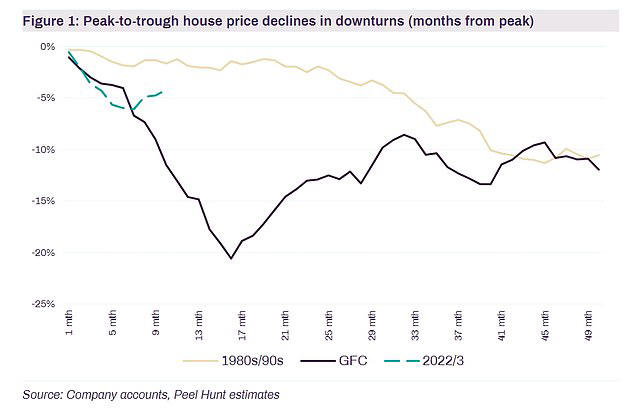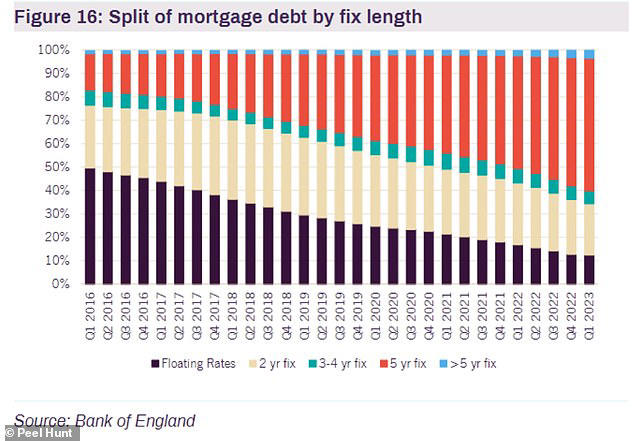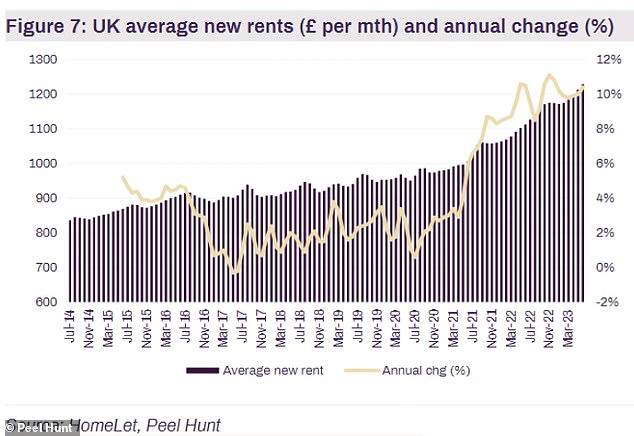The average UK house price fell at the fastest annual rate in 14 years in July, Nationwide Building Society has reported.
House prices fell by 3.8% on average annually last month – marking the largest drop since 2009, after the financial crisis. As buyers struggled to afford mortgages due to rising interest rates, house prices fell by 0.2% month-on-month in July to reach £260,828 on average. It means the price of a typical home is now 4.5 per cent below the August 2022 peak, Nationwide said.
It comes as the Bank of England rose interest rates for the 14th consecutive time to 5.25% earlier this month.
House prices will not fall as much as feared, analysts say.
House prices will not fall as much as feared despite soaring mortgage rates, thanks to rising wages and a shortage of homes, analysts predict.
The debate surrounding the short-term direction of house prices remains fiercely divided, with some predicting rapid falls with declines of as much as 35%. But Peel Hunt now forecasts prices will instead 'drift down gently', by a maximum of 15%. Continued strong demand for properties to buy, bolstered by first-time buyers hoping to escape fast-rising rents, should prop up house prices in the months ahead, according to Peel Hunt.
House prices they will avoid a 'precipitous decline' like the ones seen during the financial crisis in 2008 and the early 1990s property crash, when house prices fell by 20%, Peel Hunt said
© Provided by This Is Money
Homeowners have seen their purchasing power slashed due to rapidly rising mortgage rates and high inflation, and many fear this will continue to impact the housing market as the Bank of England is expected to hike rates further. But relatively low unemployment and strong wage growth should help people absorb higher borrowing costs, according to analysts.
They also claim that the impact of rising mortgage rates will not be immediate, as buyers increasingly choose fixed-rate deals in the hope of avoiding more hikes to borrowing costs. Currently, 87% of UK mortgage debt is on fixed rates, versus 13% on variable rates.
Peel Hunt said "the changing nature of the UK mortgage market, with a higher penetration of fixed-rate mortgages, is dampening and delaying the impact of increased mortgage rates. The imbalance between the supply of homes and demand for rented properties has pushed rents up rapidly in recent years, underpinning demand for the owned tenure. Lastly, the strength of the economy is not only increasing mortgage capacity as wages grow, but sustained house price declines only tend to occur in period of high unemployment and significant recession, which is not consistent with current economic forecasts."
The rapid growth of fixed-rate mortgage products post the financial crisis is dampening the impact of rate increases, according to Peel Hunt
© Provided by This Is Money
Peel Hunt analysts predict that house prices will continue to 'weaken moderately' over the next six to nine months. But they will avoid a 'precipitous decline' like the ones seen during the financial crisis in 2008 and the early 1990s property crash, when house prices fell by 20%. 'Following that, the rate at which they increase again will likely be dictated by the strength of the underlying economy (wages) and mortgage rates,' Peel Hunt added.
Mortgage rates have fallen moderately, but the average two-year fixed rate deal remains higher than at the beginning of the month, at 6.83%, according to market monitor Moneyfactscompare. They could still rise further, with the Bank of England bumping up the base rate to 5.25%
House prices fell by 2.6% this month, the fastest rate in 12 years, according to Halifax - though Britain's biggest mortgage lender said this largely reflected the impact of historically high house prices last summer. It also said the figures 'do suggest a degree of stability in the face of economic uncertainty, and the volume of mortgage applications held up well throughout June, particularly from first-time buyers'.
Continued strong demand for properties to buy, bolstered by people hoping to become home owners to escape fast-rising rents (see chart), should prop up house prices
© Provided by This Is Money
But developers have been warning of a slowdown, with the UK's biggest housebuilder, Barratt, revealing it could build 20% fewer homes this year amid a downturn in property markets. This is having an impact on companies supplying housebuilders, which are seeing fewer orders.
Today, landscaping specialist Marshalls warned that 'persistent weakness' in the building of new houses and homeowners cutting back on property improvements would hit trading in the coming months.'The sustained high levels of inflation, increasing interest rates and weak consumer confidence means that the board anticipates the group's performance in the second half will be below its previous expectations,' it told shareholders today.
Given the 'challenging trading conditions', Marshalls said it would cut a further 250 jobs, as it closes down its factory in Carluke, reduces shifts in other facilities and restructures the group's commercial team. The job losses, which should save it around £9million, are on top of the 150 jobs already slashed in the second half of last year.
Marshalls shares slumped 5% to 262p earlier this month.
But Britain's biggest housebuilders, including Persimmon, Vistry, Bellway, Barratt and Redrow, seemed little affected by the warning, with shares down by no more than 0.3%.
Peel Hunt analysts said "with a precipitous decline in house prices unlikely, we view the risk of significant asset write-downs as low. With that in mind we continue to see good value in those builders trading at significant discounts to TNAV, such as Redrow and Bellway, or those with a differentiated product offering, such as Gleeson or Vistry Group."
UK house prices: Lloyds Bank issues update as it warns of four year decline
Lloyds Banking Group has issued a half-year update on house prices and altered its assumptions on growth. The financial services company expects average house prices to drop this year. The base case scenario forecasts a decline of 5.4%. December’s prediction was slightly more pessimistic at 6.9%.
Lloyd’s most severe downside would see prices drop by 9.3%. However, the bank predicted a 14.8% drop under the same scenario six months ago. A probable scenario would result in 5.6% drop this year.
But the decline will likely balance out across the next four years, with an average decline of just 1.1%. Lloyds predicted the most probable decline would be 7.7% with average growth over four years of 1.2% in December. The bank claimed there remains a “potential risk to affordability” due to persistently high levels of inflation and increasing interest rates. The risk has not been totally accounted for by its credit loss models.
Lloyds said “this risk is to customers maturing from low fixed rate deals, the building impact on variable rate product holders, lower levels of real household income and rental cover value.”
His Majesty’s Land Registry recently released the UK’s house price index for May 2023. It showed house prices have not changed since April but there has been an annual price rise of 1.9%. The increase took the average property price in the United Kingdom to £285,861. Annual house price inflation was highest in the North East of England at four per cent in the 12 months to May 2023.
The East of England witnessed the lowest annual growth over the same period.
UK house-building falls again as rate hikes bite: PMI
Britain's construction sector returned to growth in July but house-builders suffered another sharp contraction due to higher interest rates and fears about the outlook for the economy, a survey showed on Friday. The S&P Global/CIPS construction Purchasing Managers' Index (PMI) recovered to 51.7, its highest level since February and up from June's five-month low of 48.9.
A sub-index measuring the house-building sector picked up to 43.0 from June's 39.6 - the lowest since Britain's economy was stuck in its first coronavirus lockdown in May 2020 - but still a long way below the 50.0 no-change level. The Bank of England (BoE) has raised borrowing costs steadily since December 2021 and took its benchmark interest rate to a 15-year high of 5.25% earlier this month.
The PMI survey showed that, unlike house-building, civil engineering and commercial construction gathered speed in July. The rate of inflation for building materials was much softer than the average of the first half of 2023, pushed down by weaker demand and competition among suppliers.
Business confidence in the sector edged up after dropping in June to its lowest since January. S&P's all-sector PMI, which includes services and manufacturing PMI data released earlier in the week, dropped to a six-month low of 50.9 from June's 52.5.
Britain's economy looks set to grow only marginally over the next three years, according to the BoE's latest forecasts. Some economists think a recession is approaching.




